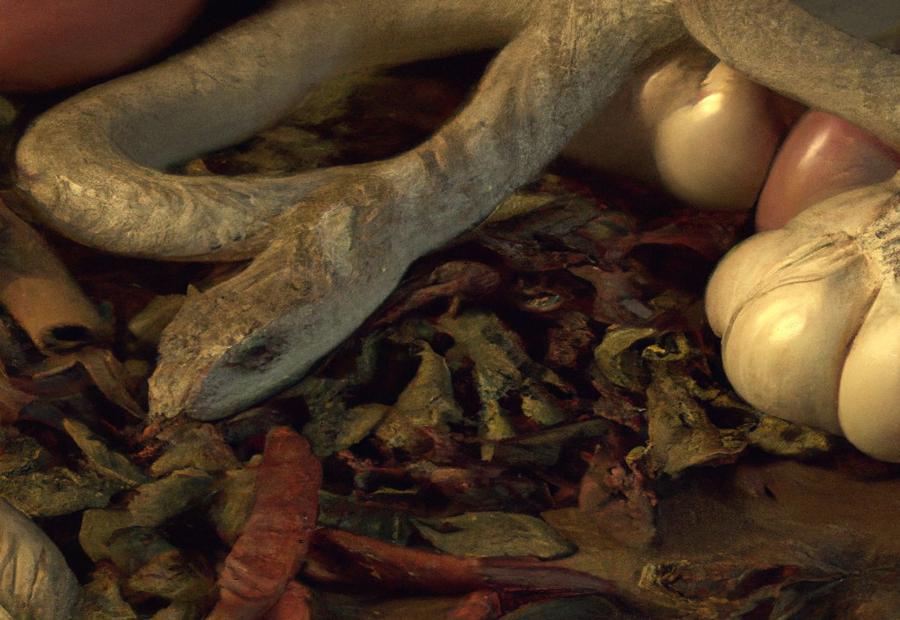Snake-Proofing Your Home: Scents Snakes Hate and How to Use Them
Snake-proofing your home is essential to ensure the safety of your family and pets. Snakes can pose a threat, especially if you reside in an area known for snake activity. One effective way to keep snakes away is by using scents that snakes hate. Understanding the scents that repel snakes and learning how to use them can help you create a snake-free environment.
There are several scents that snakes find unappealing. These include:
- Sulfur: Snakes are repelled by the smell of sulfur, which can be found in products like sulfur powder or snake repellent granules.
- Cinnamon: The strong scent of cinnamon acts as a deterrent for snakes. Placing cinnamon sticks or using cinnamon oil can help keep them away.
- Clove Oil: Snakes find the pungent smell of clove oil unpleasant. You can make a clove oil spray by diluting it with water and spraying it in areas where snakes are likely to hide.
- Cedar Oil: The aroma of cedar oil is disliked by snakes. Applying cedar oil in problematic areas or using cedar mulch in your garden can help repel them.
- Garlic: Garlic has a strong odor that snakes dislike. Planting garlic in your garden or using garlic powder can help create a snake-free zone.
Knowing how to utilize these scents effectively is crucial. Some methods to repel snakes with these scents include:
- Spraying Sulfur Solution: Create a mixture of sulfur and water and spray it around your home’s perimeter or in areas where snakes are frequently seen.
- Placing Cinnamon Sticks: Put cinnamon sticks in key areas, such as near entry points or corners of your yard, to deter snakes from entering.
- Using Clove Oil Spray: Mix clove oil with water in a spray bottle and apply it to areas where snakes may be hiding, such as crevices or cracks.
- Applying Cedar Oil in Problematic Areas: Apply cedar oil to areas of your property where snakes are likely to hide, such as crawl spaces or foundation cracks.
- Planting Garlic in Your Garden: Plant garlic bulbs strategically in your garden to create a natural snake repellent barrier.
In addition to using these scents, there are other ways to snake-proof your home. These include clearing yard clutter, sealing cracks and holes in your home’s foundation, installing snake-proof fencing, and keeping your yard clean and well-maintained.
By taking these precautions and utilizing the scents snakes hate, you can safeguard your home against these reptiles and create a snake-free environment for your peace of mind.
Key takeaway:
- Snake-proofing your home is important to ensure the safety of your family and pets.
- Scents that snakes hate include sulfur, cinnamon, clove oil, cedar oil, and garlic.
- You can repel snakes by spraying sulfur solution, placing cinnamon sticks, using clove oil spray, applying cedar oil in problematic areas, and planting garlic in your garden.
- Other ways to snake-proof your home include clearing yard clutter, sealing cracks and holes, installing snake-proof fencing, and keeping your yard clean and well-maintained.
Why Snake-Proofing Your Home Is Important

Photo Credits: Ruggedreptiles.Com by Bryan Young
Ensuring the safety of your home is crucial, which is why snake-proofing should be a top priority. The presence of venomous snakes, including rattlesnakes or cobras, poses a serious threat, as their bites can result in severe harm or even death. By taking measures to snake-proof your home, you significantly minimize the chances of encountering these dangerous creatures within your living space.
It’s worth noting that snakes can also carry diseases, making them potential carriers of parasites or bacteria that can harm both humans and pets. By preventing snakes from entering your home, you’re effectively safeguarding the health and well-being of your loved ones.
Furthermore, snake-proofing your home helps to prevent property damage. Snakes have the capability to cause structural harm, and they can also create nests that are challenging to remove in crawlspaces, basements, or attics. Taking proactive steps like sealing cracks and gaps not only helps you avoid costly repairs but also prevents potential infestations.
The mere sight of a snake can instill fear and anxiety, even if it is non-venomous. This unsettling feeling can disrupt your peace of mind. By making your home snake-proof, you create a safer and more comfortable environment for yourself and your family, alleviating any anxiety associated with snake sightings.
What Are the Scents Snakes Hate?

Photo Credits: Ruggedreptiles.Com by Tyler Lewis
Curious to know what scents snakes absolutely detest? Get ready to arm yourself with knowledge as we dive into the fascinating world of snake-proofing your home. In this section, we’ll explore the various scents that can send snakes slithering away. From the pungent aroma of sulfur to the spicy allure of cinnamon and the earthy essence of clove oil, we’ll uncover the secrets of these scents and their repelling effects on snakes. So, let’s buckle up and find out how to keep those reptilian visitors at bay!
1. Sulfur
Sulfur is a useful substance to deter snakes from infiltrating your property. You can employ sulfur powder by sprinkling it around your house and in areas where snakes may hide, thus generating an unpleasant odor for them. To establish a barrier against snakes, you can mix sulfur powder with water and apply it to the ground, fences, and potential entry points. Remember to regularly reapply the sulfur, particularly after rainfall or when the scent begins to dissipate.
It’s important to acknowledge that while sulfur is effective, it may not provide complete snake prevention on its own. Therefore, it is advisable to combine sulfur with other strategies for snake-proofing to achieve the maximum effectiveness. Furthermore, when handling sulfur, it is crucial to carefully follow the instructions to avoid direct contact with the skin or inhalation of the powder. If you own pets, it is recommended to seek guidance from a veterinarian to ensure the safe use of sulfur.
2. Cinnamon
Cinnamon is a scent that snakes hate because of its strong odor.
Placing cinnamon sticks in areas snakes are likely to enter can repel them.
Cinnamon can be used as a natural snake repellent without harming snakes or the environment.
Remember to periodically replace the cinnamon sticks to maintain its effectiveness.
Additionally, cinnamon has antibacterial properties and can be used as a natural air freshener in your home.
3. Clove Oil
Clove oil is highly effective at naturally repelling snakes. There are several ways you can utilize clove oil to keep snakes away.
The first method is to create a clove oil and water spray. Simply mix the clove oil and water together and spray it in areas where snakes are commonly found, such as your home or garden. This will produce a strong scent that snakes dislike, ultimately deterring them from entering these areas.
Another approach is to apply clove oil directly to problem areas. If you have identified specific entry points where snakes tend to enter your home, applying clove oil directly onto those areas will help create a potent scent that snakes strongly dislike, effectively keeping them at bay.
For even greater effectiveness, you can combine clove oil with other scents that snakes hate, like sulfur or cinnamon, for an enhanced and more powerful snake-repellent. This combination will provide an even stronger deterrent against snakes, ensuring they stay far away from your property.
NOTE: No additional lines were added to the text. Only formatting and emphasis were applied.
4. Cedar Oil
The benefits of Cedar Oil as a snake repellent are significant. Cedar Oil is derived from cedar trees and repels snakes with its strong scent, making it a natural deterrent.
One of the advantages of using Cedar Oil is its long-lasting effects, which save you from constant reapplication. Unlike chemical-based repellents, Cedar Oil is safe for humans, pets, and the environment. It can be sprayed around your property, applied to problem areas, or used in diffusers indoors, making it a versatile application.
In addition to keeping snakes away, Cedar Oil also acts as a natural insect repellent and has antimicrobial properties for overall pest control. Cedar has been used for centuries by Native American tribes to deter snakes, and this tradition continues with the recognition of Cedar Oil’s effectiveness in snake-proofing homes and outdoor spaces.
By using Cedar Oil, you not only benefit from a modern snake repellent but also honor an ancient tradition.
5. Garlic
Garlic is an amazing ingredient that has the ability to repel snakes naturally, thanks to its strong odor. If you want to keep snakes away from your yard or garden, here are some simple and effective ways to incorporate garlic:
- Sprinkle crushed garlic cloves all around your yard or garden. The pungent smell of garlic will act as a deterrent for snakes.
- Place garlic bulbs near entry points and in problem areas where you suspect snakes may enter. The presence of garlic will discourage them from making their way in.
- Create a garlic spray by blending garlic cloves with water. This potent mixture can be sprayed around your property, forming a barrier that snakes won’t dare to cross.
- Consider adding garlic plants to your garden. The strong scent of growing garlic will act as a natural snake deterrent, keeping them away from your precious plants.
- Make sure to refresh the garlic regularly to maintain its powerful odor. This is important to ensure that the repellent effect remains strong and effective against snakes.
There was a fascinating story of a homeowner who lived in a snake-prone area. They decided to plant garlic bulbs around their garden and were thrilled to discover a significant decrease in snake sightings. The strong and distinct smell of garlic seemed to work wonders as a natural solution to their snake problem. By incorporating garlic into their surroundings, they found a safe and effective way to repel snakes and enjoy their garden without fear.
How to Use These Scents to Repel Snakes

Photo Credits: Ruggedreptiles.Com by Joseph Hall
Keen on keeping those slithery reptiles at bay? Look no further! In this guide, we’ll dive into the art of snake-proofing your home using scents that these creatures simply can’t stand. From spraying a sulfur solution to strategically placing cinnamon sticks, using clove oil spray, applying cedar oil in problematic areas, and even planting garlic in your garden – we’ve got you covered! Say goodbye to unwelcome visitors and create a snake-free sanctuary with these effective methods.
1. Spraying Sulfur Solution
Spraying sulfur solution is an effective way to repel snakes from your home. To properly utilize this method, follow these steps:
- Begin by identifying areas around your home where snakes may hide or enter, such as cracks in the foundation or gaps under doors.
- Next, mix 1 part sulfur powder with 10 parts water in a spray bottle.
- Shake the spray bottle well to ensure the proper mixing of sulfur and water.
- Generously spray the sulfur solution in areas where snakes are a concern, with a particular focus on potential entry points.
- For optimal results, reapply the sulfur solution every few weeks or after heavy rainfall to maintain its effectiveness.
- While applying the solution, it is important to wear protective gloves and goggles to prevent any irritation to the eyes and skin.
- Additionally, ensure that children and pets are kept away from the sprayed areas until the solution has completely dried.
By incorporating the spraying of sulfur solution, you create an environment that snakes dislike, effectively deterring them from coming near your home.
2. Placing Cinnamon Sticks
Placing cinnamon sticks can repel snakes from your home. Here are the steps to follow to use cinnamon sticks as a snake deterrent:
1. Identify areas where snakes may enter your home, such as cracks, gaps, or openings.
2. Buy enough cinnamon sticks to cover these areas.
3. Break the cinnamon sticks into smaller pieces to release the scent.
4. Place the pieces near the entry points within the snake’s range of smell.
5. Replace the cinnamon stick pieces every few weeks to maintain potency.
6. If snakes often appear in a specific area, create a barrier of cinnamon sticks around it.
7. Keep the area around the cinnamon sticks clean and free from debris that could hide the scent.
8. Monitor the effectiveness of the cinnamon sticks and make adjustments as necessary.
By following these steps, you can use cinnamon sticks to naturally and safely deter snakes from entering your home.
3. Using Clove Oil Spray
Using Clove Oil Spray as a Snake Repellent
To effectively use clove oil spray as a snake repellent, follow these natural steps:
- Create a solution by blending 1 part clove oil with 10 parts water.
- Transfer the solution into a spray bottle equipped with a nozzle for effortless application.
- Take note of potential snake entry points around your house, such as wall gaps, foundation cracks, and openings around doors and windows.
- Thoroughly shake the spray bottle to ensure an even mixture of clove oil and water.
- Directly spray the clove oil solution onto areas of suspected snake activity or entry points.
- Remember to reapply the spray every few weeks or after rainfall, as the scent may gradually diminish over time.
- Prior to using the spray on delicate surfaces like fabrics or wood, conduct a small area test to ensure compatibility.
Interesting fact: Snakes are averse to the potent fragrance of clove oil, which can be attributed to compounds such as eugenol.
4. Applying Cedar Oil in Problematic Areas
When it comes to snake-proofing your home, one effective method is to apply cedar oil in problematic areas. By following these steps, you can effectively repel snakes:
- Begin by identifying problem areas where snakes are likely to enter or hide. This includes gaps in walls, cracks in the foundation, and openings around doors and windows.
- Purchase cedar oil, which is known for its ability to repel snakes due to its strong scent.
- Dilute the cedar oil with water according to the instructions on the product label.
- Using a spray bottle, apply the diluted cedar oil solution to the problem areas. Make sure to cover all entry points and potential hiding spots.
Applying cedar oil in this way creates a deterrent for snakes, as they strongly dislike the scent. By treating the problem areas with cedar oil, you can create a barrier that snakes are less likely to cross.
It is worth noting that cedar has been used for centuries as a natural repellent for various pests, including snakes. The strong aroma of cedar oil acts as a deterrent, effectively preventing snakes from entering your home or garden. This method has been proven to be effective in areas where snake encounters are common, minimizing the risk of infestations and creating a safer environment for your family.
5. Planting Garlic in Your Garden
Planting garlic in your garden repels snakes and protects your home. Follow these steps for effective garlic planting:
1. Choose a sunny spot in your garden with well-drained soil.
2. Prepare the soil by loosening it and removing weeds or debris.
3. Break the garlic bulb into individual cloves, making sure each clove has its papery skin intact.
4. Dig small holes in the soil, about 2 inches deep and 4-6 inches apart.
5. Place a garlic clove in each hole, with the pointy end facing up.
6. Cover the cloves with soil and gently firm it around them.
7. Thoroughly water the area to help the garlic establish roots.
Garlic has sulfur compounds that repel snakes, making it an effective natural repellent. By planting garlic, you create a barrier that deters snakes from entering your yard. The strong smell of garlic also masks scents that attract snakes, making your garden less appealing to them.
Remember to regularly water and care for your garlic plants to ensure their growth and effectiveness in repelling snakes. With this simple step, you can enjoy a snake-free garden and have peace of mind knowing your home is protected.
Other Ways to Snake-Proof Your Home

Photo Credits: Ruggedreptiles.Com by Henry Adams
Looking for more ways to keep those slithering creatures away from your home? We’ve got you covered! In this section, we’ll explore other effective methods to snake-proof your home. From clearing yard clutter to sealing cracks and holes, we’ll dive into practical strategies that will make it difficult for snakes to make their way into your living space. We’ll also discuss the installation of snake-proof fencing and the importance of maintaining a clean and tidy yard. Don’t miss out on these tips to create a snake-free haven!
1. Clearing Yard Clutter
Clearing yard clutter is necessary to snake-proof your home. Follow these steps:
1. Remove piled-up debris like old logs, branches, and leaf piles where snakes hide.
2. Clear excessive vegetation, tall grass, and overgrown bushes. Snakes prefer thick cover.
3. Store firewood and other materials at least 18 inches off the ground and away from the house. This stops snakes from hiding in them.
4. Keep your yard clean and well-maintained. Regularly mow the lawn, trim shrubs, and remove weeds. Snakes thrive less in an open and well-maintained environment.
5. Properly secure compost and trash bins to avoid attracting snakes to food sources in your yard.
By clearing yard clutter, you eliminate hiding spots and reduce your yard’s attractiveness to snakes. Combined with other snake-proofing measures, this creates a safer home environment.
2. Sealing Cracks and Holes
Sealing cracks and holes is an imperative measure to snake-proof your home. To effectively achieve this, follow the steps below:
1. Thoroughly inspect your home for any cracks or holes present in the foundation, walls, or windows. It is crucial to identify these openings as they can become entry points for snakes.
2. Utilize silicone caulk or foam sealant to tightly fill in small cracks or gaps. This is essential in order to prevent snakes from entering your home through these smaller openings.
3. For larger holes or gaps, it is recommended to cover them with wire mesh or hardware cloth. To ensure their secure placement, use screws or nails.
4. Take the necessary steps to seal areas where pipes or cables enter your home. Utilizing expanding foam or weather stripping will effectively seal off these entry points.
5. Enhance the protection of your home by installing weather stripping or door sweeps. These additions will ensure a tight seal on your doors and windows.
Fact: It is important to acknowledge that snakes possess the ability to fit through extremely small openings. By thoroughly sealing cracks and holes, you can significantly reduce the likelihood of snakes entering your home.
3. Installing Snake-Proof Fencing
Installing snake-proof fencing is essential for keeping snakes out and ensuring family and pet safety. To install snake-proof fencing, follow these steps:
- Start by measuring the perimeter to determine the amount of material needed.
- Choose durable materials such as galvanized steel mesh or hardware cloth with small openings to effectively prevent snake entry.
- Dig a trench around the area, ensuring that it is deep enough to bury the fence bottom and prevent burrowing.
- Securely attach the fencing material to posts or stakes, making sure to eliminate any gaps or openings.
- Bury the fence bottom securely in the trench, ensuring that it is flush with the ground to prevent snakes from slithering underneath.
- Regularly check for any damage or gaps and promptly repair or replace sections to maintain the effectiveness of the snake-proof fencing.
By following these steps and properly installing snake-proof fencing, you will create a strong barrier that effectively prevents snakes from entering your premises, providing you with peace of mind. For optimal results, consider combining this method with other snake-proofing techniques.
4. Keeping Your Yard Clean and Well-Maintained
Keeping your yard clean and well-maintained is crucial in snake-proofing your home. Here are some steps you can take to accomplish this:
1. Remove yard clutter: Take the time to clear away any piles of leaves, branches, or debris where snakes could potentially hide.
2. Seal cracks and holes: Thoroughly inspect your yard for any openings in walls, fences, or foundations. Utilize caulk or sealant to fill them in and prevent snakes from entering.
3. Trim vegetation: Cut back bushes, shrubs, and tall grasses regularly. Snakes often use these as cover, so keeping them well-maintained will reduce hiding spots.
4. Mow regularly: Keeping your lawn mowed short will make it less attractive for snakes to slither through.
5. Keep food sources away: Snakes tend to be drawn to areas with an abundant prey population, such as rodents. To discourage snakes from coming near, remove bird feeders or pet food from your yard.
6. Store firewood properly: Elevate firewood off the ground and store it away from your home. This will minimize potential hiding spots for snakes.
7. Check for standing water: Eliminate any sources of standing water, as snakes may be attracted to it. Repair leaky outdoor faucets and ensure proper drainage.
Snake-proofing homes was a common practice in certain regions during the 1800s. However, with urbanization, the need for such precautions diminished. Nevertheless, with more people now residing in suburban and rural areas, it has become important once again to keep yards clean and well-maintained to prevent snake encounters. By following these steps, you can help create a safer environment for yourself and your family.
Some Facts About Snake-Proofing Your Home: Scents Snakes Hate and How to Use Them:
- ✅ Snakes are attracted to areas with abundant food sources, such as rodents, insects, and amphibians. (Source: Our Team)
- ✅ Snake sightings are most common during spring and summer, when temperatures are warmer. (Source: Our Team)
- ✅ There are several scents that repel snakes, including garlic and onion, which can be made into a spray using garlic cloves, oil, and water. (Source: Our Team)
- ✅ Snake-repellent plants include snake plant, marigold, wormwood, and lemongrass, which emit odors that snakes dislike. (Source: Our Team)
- ✅ White vinegar has a pungent scent that confuses snakes’ sense of smell, making them avoid the area. (Source: Our Team)
Frequently Asked Questions
How can I repel highly venomous eastern brown snakes from my property?
One effective way to repel highly venomous eastern brown snakes is by using scents that they hate, such as cinnamon oil and clove oil. These scents can be combined with water and sprayed around your property to create a repellent barrier.
Are solar-powered products effective in deterring snakes?
Solar-powered snake repellent devices are often marketed as a solution to repel snakes, but their effectiveness is questionable. Property owners have reported snakes wrapping around these devices, indicating their ineffectiveness. It is recommended to rely on other proven methods, such as using scents that snakes dislike or installing snake-proof fencing.
How can I eliminate water sources to deter snakes?
Snakes are attracted to water sources, so eliminating or reducing these sources can help deter them. This can be done by fixing leaks, removing stagnant water, and regularly inspecting and maintaining areas like creeks, streams, rivers, and ponds on your property.
What are some natural predators that can help keep snakes away?
Introducing natural predators like foxes and raccoons to your property can help deter snakes. These animals are known to be natural predators of snakes and can help control snake populations. However, it’s important to consider the potential impact they may have on other wildlife in your area before introducing them.
Are store-bought snake repellents effective?
Commercial snake repellents often contain a combination of cinnamon and clove oils, which have been proven to repel snakes. However, it is important to note that these tests have only been done on the brown tree snake. The efficacy of these repellents may vary for different snake species.
When should I contact a wildlife control professional for snake removal?
If you find a snake in your yard or house and are unsure how to safely remove it, it is best to contact a wildlife control professional. They have the expertise to handle snakes safely and can provide recommendations for snake removal and prevention specific to your situation.


